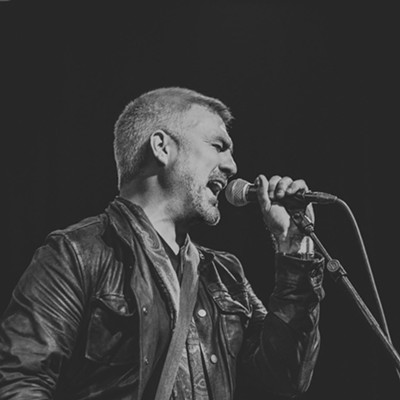Ryne Warner and Benjamin Ford-Sala have worked together on farms, their bands have shared members and they've explored the same themes in their music and lyrics.
So when Warner and Ford-Sala found themselves each with a few stray songs, they decided to forge a split release, a cassette with Ohioan on one side and Young Hunter on the other.
"We just had a period about a year ago where we were both really excited about each other's band," says Warner, who dreamed up his musical project, the ever-shifting Ohioan, on a walking and hitchhiking trip from Chicago to Portland, Ore. "We're both interested in similar writers and similar lyrical and musical themes, so we bonded hard over that. We had these two little chunks and lyrically and thematically you could fit them together."
The cassette brings a release party Friday, Jan. 24, to Club Congress. The free show will be a mix of return and farewell for each band. Ohioan hasn't performed in Tucson for seven months and Warner says the show will mark the end of a period of heavier music for the band. Now living in Portland, Ford-Sala will return to unite the seven-member version of Young Hunter that recorded its share of the cassette.
Both Ohioan and Young Hunter can jump across the spectrum from spare and folky to heavy, loud and experimental.
When Ford-Sala moved to Tucson several years ago, he began Young Hunter as a folk duo with Julia DeConcini. "I feel like my songwriting got hijacked by the desert," he says, and the folk songs grew bigger, louder and darker, to the point the band started getting called doom metal.
"When I moved there, all I started writing about was all the different impressions I got from being there. In the Southwest, there's such an extreme dichotomy between the metropolises that exist and the way of the desert, and what it actually takes to live in the desert. In the modern day, pretty much anywhere, city dwellers seem to be out of touch with the rhythms of the Earth and the reality of it, but it's really intense in the Southwest," he says.
"The folk songs we did were lyrically pretty heavy and a lot of what was being talked about in those songs just translates to heavy music pretty well," Ford-Sala says. "There's so much intensity going on in the world right now and to me it feels very appropriate to respond to that with something that something that's equally intense."
Young Hunter's side of the cassette is a three-song thunderstorm, exploring what sort of fate humanity might have in the face of cataclysmic changes to the planet.
"To me they're all kind of about staring into the void of potential futures on this planet. There are a lot of changes happening environmentally and with the infrastructure our lives are built on, and the future could look very different than the present. To me, it might look a lot like the darker pasts that humanity has experienced," Ford-Sala says. "The songs are about going into that darkness, but also moving through it. It's important to look at what we're possibly in for, but it's not completely bleak and hopeless. There is a light."
Ohioan's side represents a journey for Warner, one that collects and recombines his experiences and musical transitions, from teenage hardcore bands to solo acoustic music to pedal-heavy experimental noise rock in Portland to a more spare, if still loud and heavy, sound that he adopted in Tucson.
"I grew up playing hardcore music and metal in Ohio, toward the end of the heyday of Midwest hardcore. That culture left the biggest impression on me, everything having a political tint or a sociological tint and holding community accountable—just stuff other than singing about relationships," Warner says.
"In Portland I was in the thick of this really amazing moment, where there was a lot of experimental music and people trying out new ideas. I was seeing these really crazy bands with weird instrumentation and I got inspired to just do that. It seemed an interesting way to approach a normal song recorded on acoustic guitar and stretch it and morph it and touch on all these different aspects."
Adopting and changing his music based on where he is, letting the environmental influences guide Ohioan, is important for Warner. He calls the band "a situational art project."
"It's me being from this place, but living in other places and letting these places filter through me," he says.
After years in the Northwest, embracing what he calls the feminine energy of Portland, Warner says he felt drawn to the desert, with its harsh and masculine energy.
"I just needed to balance out the energy and reconcile that and just swing the pendulum really hard. I love the way it speaks to me here," he says.
Ohioan's music turned over a new leaf in Tucson as well.
"There are real pickers here, people who are traditionally skilled. Even the rock bands can really play. They've got chops here. There aren't people moaning through a delay pedal like there were in Portland. You can't get away with a lot of hiding behind experimentation," Warner says. "I was looking for something different and it definitely rearranged my priorities as far as wanting to do what I do, but also have an audience. It made me have to get better and start taking away some of the pedals."
Warner and Ford-Sala say their pieces, both recorded with Jim Waters, feel like intertwined work. Both creatively restless, they agreed that before their bands evolved—in tone and style and theme and place and members—again, they needed a showcase for such a fertile period in their music.
"These songs for both of us were born out of that period where we were mutually admiring each other and really stoked on what the other guy was doing," Warner says. "It was such a crew, the two bands, that it seemed like a really apt thing to document that."







